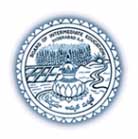
Board of Intermediate Education, Andhra Pradesh
(PHYSICS)
Time : 3 hours
Max. Marks : 60
SECTION - A
Note:
1) Answer all the questions. 10 x 2 = 20 Marks
2) Every correct answer carries 2 marks.
3) All are very short answer type questions.
1. Write the dimensional equation for coefficient of dynamic viscosity
using its formula.
2. If the coefficient of restitution equals to one explain the behaviour of
motion of the colliding bodies having equal masses with reason.
3. The position vectors of two bodies of masses 2 kg and 3 kg are given as
2i+ 3j+ 5k and 3i-5j+ 7k. Find the position vector of centre of mass of the
system.
4. What is Chandrasekhar limit and mention its value in terms of solar mass?
5. What is surface tension of a liquid and mention effect of temperature on
it?
6. Write any two applications of Bernoullie’s theorem.
7. Why the glass beaker breaks when cold water sprinkled on it?
8. What is triple point of water?
9. State Newton’s law of cooling.